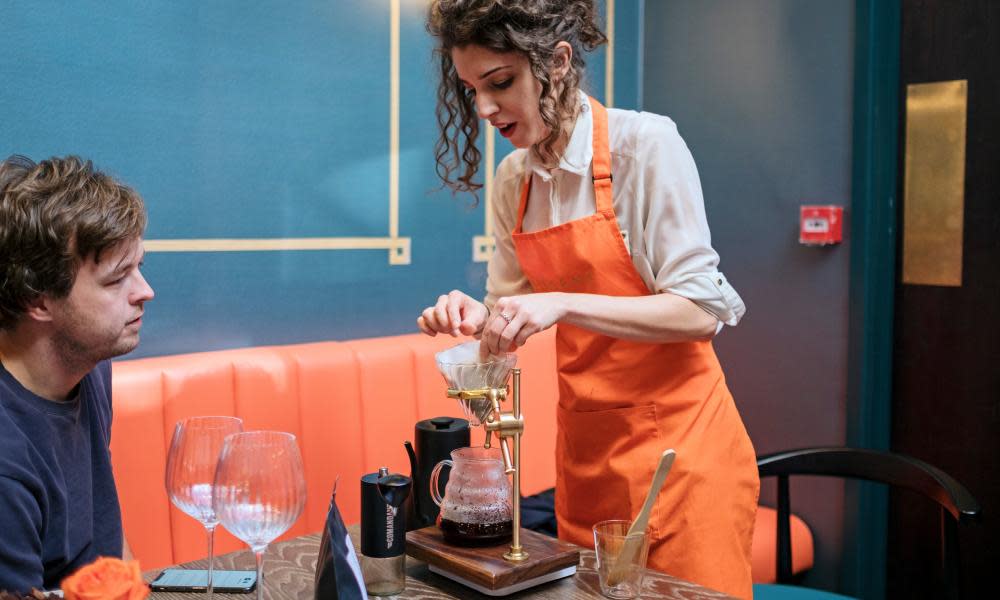‘Reminds me of vegetable soup’: how does a £50 cup of coffee taste?

For £50, you can buy a return flight to Paris from London or Manchester, or a set of Liberty facemasks, or a bottle of Veuve Clicquot champagne.
Or, if you’re feeling really fancy, you could go to Mayfair, and have a cup of coffee. Well, a goblet of it, to be precise.
This is the USP of Queens of Mayfair, a central London cafe that weathered a corona-cursed first few months to become a popular venue for well-heeled locals in search of a brew and a posh donut.
The newly opened establishment bought 450g of beans from the Ethiopian producer, Nigussie Gemeda Mude – and were canny enough to press release it.
Gemeda’s crop set a record this week at the prestigious “Cup of Excellence” auction, where its performance in blind taste tests led a consortium of international buyers to pay $1.3m, or £314 per kilo, for a share of the spoils.
In the UK, only Harrods and Queens’ supplier Difference Coffee Co. got a piece of the action.
Queens basked in the headlines declaring itself the purveyor of the UK’s “most expensive filter brew”.
Could I come in and have some? Yes, I was told, but there were only a couple of servings left, and I’d have to secure mine with a deposit.
Forty-five breathless minutes later, I sat down to try it.
For £50, you get theatre as well as caffeine. It starts when the head barista, Sabrina Pastano, puts down a bag of beans, a grinder, a handsome Heath Robinson-ish filtration system, and a weighing scale.
“It’s gonna be completely different to anything you’ve had before,” says Pastano, who holds several certificates in coffee expertise, and also a masters in economics.
She opens the bag and invites me to take a whiff.
“It’s unbelievable. You really can taste a lot of blackberries, white peach, raspberries, apricot, and the mouthfeel is so creamy. Almost like honey. And it isn’t acidic at all. Even people that don’t like coffee, it’s impossible you don’t like this. It’s like a very floral tea.”
At which point, sceptics might ask if you couldn’t just have a cup of very floral tea.
Pastano measures out 15g of beans, grinds them, and covers them in an initial portion of water, which has been heated to exactly 94 degrees.
This brings about the “bloom’, forcing a delicate cluster of CO2 bubbles to the surface. Now the rest of the water is poured on, and once the drip is done, it’s ready to drink.

Should I have just flown to Paris and back instead?
I catch myself swirling the coffee round the glass as if I’m at a wine tasting. Then I worry I’m making a fool of myself and try it.
Once my taste buds have stopped screaming “HOW MUCH?!”, they relax.
The coffee has a mellow bouquet that seems clean and comforting at the same time, as light as it is restorative.
Then the rogue thought crosses my mind that it slightly reminds me of vegetable soup, and my reverie is sadly broken.
Is it worth £50 for a cup? Well, obviously not.
“People aren’t used to viewing coffee in the same way as a really high-end whisky or wine,” says Stephen Hurst, founder of Mercanta coffee suppliers.
“A £50 whisky isn’t 10 times better than Johnny Walker, of course it isn’t, but what you’re paying reflects the process and the provenance and the experience, not just the coffee itself.”
Maxwell Colonna-Dashwood, a three-time UK barista champion and founder of Colonna Coffee, says that the underlying bean is genuinely special.
“The auction blind taste tests are very rigorously done, and this is an exceptionally high score,” he says. The price, he says, is “just a measure of what someone is willing to pay.”
As for Gemeda, the producer, he is pretty happy with his share.
“Never could I have imagined coffee would have sold with such price,” he told Global Coffee Report. “Now I know there is a reason for coffee to be called the green gold.”
Colonna-Dashwood notes, though, that while the auction price was a record, there’s also a vast mark-up.
Gemeda’s share works out at about £4.72 per cup – leaving Difference Coffees Co and Queens of Mayfair sharing the £45.28 difference.
Before I leave, someone cheerfully mentions that only two customers have tried it so far, and the other one was also a journalist. Still, orders may yet explode.
If anyone needs to wake up and smell the honey and apricot, it probably isn’t them.

 Yahoo News
Yahoo News 
